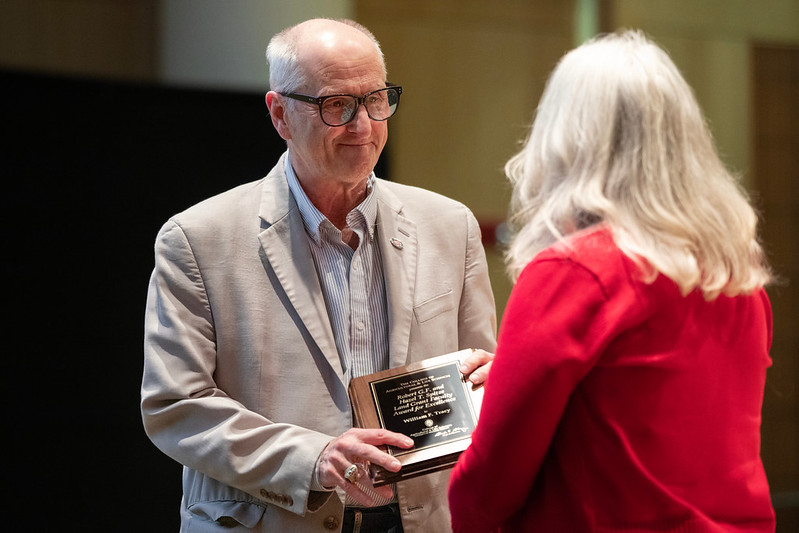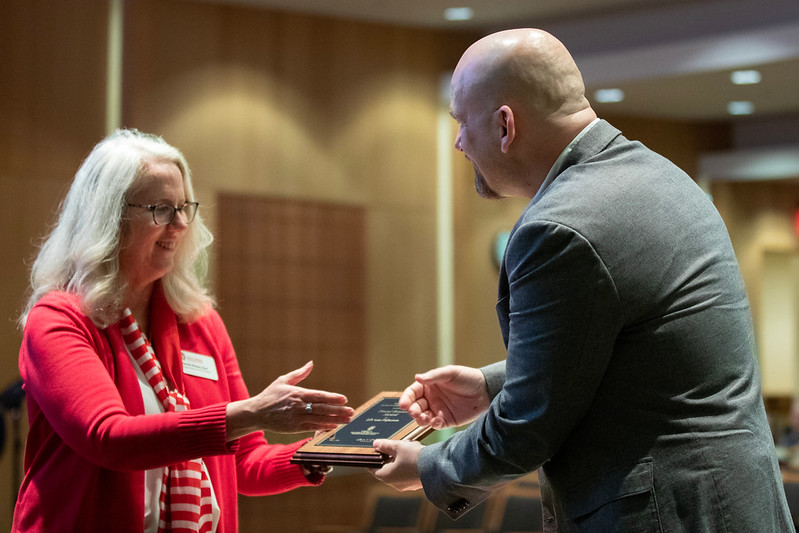CALS Awards: Pound Extension, Pound Research and Spitze Award recipients
Continuing with our celebration of this year’s CALS Awards recipients, we are sharing information about the winners of the Pound Extension Award, the Pound Research Award and the Robert G. F. and Hazel T. Spitze Land Grant Faculty Award for Excellence this week.
William F. Tracy

This year, the Robert G. F. and Hazel T. Spitze Land Grant Faculty Award for Excellence goes to William F. Tracy in the Department of Agronomy.
Bill has been a cornerstone of the Agronomy department and college and consistently demonstrates how to effectively integrate teaching, mentoring, research, outreach and leadership as part of serving the land-grant mission.
Bill’s research program is the largest plant breeding program in the world devoted to developing organic varieties of sweet corn. It has generated sweet corn varieties that are an important part of the breeding portfolio of commercial sweet corn programs worldwide.
As an educator, Bill has trained graduate students who continue to make meaningful impacts in the world of agriculture. He has also served as an undergraduate advisor for agronomy majors, helping approximately 400 students obtain their degrees.
In his land-grant philosophy statement, Bill asserts that the Morrill Act, created to educate Americans as we moved from an agrarian to a technological society, is all about empowerment. The land-grant mission is to empower members of the “industrial classes” to improve their livelihoods and thus the country.
Bill challenges us as we celebrate the Morrill Act, to not forget the unjust manner in which the land we occupy was expropriated from Indigenous peoples. And he reminds us that the negative effects need to be rectified.
J.P. van Pijkeren

As an associate professor in the food science department, J.P. van Pijkeren’s research group studies a probiotic bacterium called Lactobacillus reuteri found in the intestinal tract of many vertebrates, including humans. Soon after joining UW–Madison, J.P. made an imprint on the field with the development of sophisticated, effective genome editing tools for use in this bacterium, which is known for its resilience against genome editing.
J.P. was the scientist for the job – as his tenacity is matched only by his creativity. His group’s work collectively opened a novel field of research on the interplay between dietary sugars, prophages and microbial physiology with implications for both animal and human health.
And the work in high-throughput subtle genome editing in Lactobacillus reuteri has drawn interest globally. The tools he developed are used in more than 75 research laboratories in academia and industry around the world.
J.P. is not just tenacious with bacteria, but he has taken this same approach to obtain funding. Over the past 10 years, he submitted 95 grant applications, including intramural, industry and federal grants, which have been awarded $6.5 million in research funding. His research program is impressive, and his contributions to CALS, UW and this scientific area are invaluable. The CALS Pound Research Award recognizes JP’s contributions and research excellence.
Amaya Atucha
This year’s Pound Extension Award went to Amaya Atucha, an associate professor and Extension specialist in the horticulture department.
Amaya’s Extension program provides timely, research-based information in support of Wisconsin’s diverse fruit industry, including cranberry, grape and apple production. Her robust Extension work has improved the livelihoods of numerous fruit growers, including emerging and beginning farmers, across the upper Midwest by spreading research-based recommendations to improve production practices.
Amaya’s applied research and outreach programs are well supported by grants ranging from the USDA Specialty Crop Research Initiative program to several Wisconsin Cranberry Board grants – an indication of broad interest in her work.
Amaya uses a variety of methods to disseminate information, ranging from timely in-season updates in the Wisconsin Fruit News and Cranberry Crop Management Journals that she co-leads, to reaching the general public via Wisconsin Public Radio and local television news interviews. While her Extension program is driven by Wisconsin’s fruit production portfolio, the impact is felt regionally, nationally and internationally. She has been invited to give outreach presentations across the Upper Midwest and as far as Japan and Chile.

